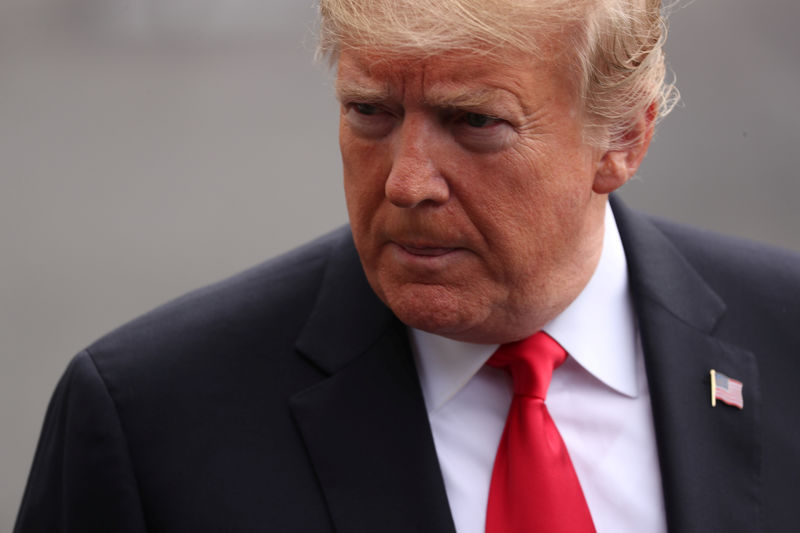
Investing.com — China’s economy shrunk, as expected, in the first quarter for the first time in three decades. President Trump sets out a plan for reopening the economy, but it will be state governors who ‘call the shots’. France made its strongest call yet for joint ‘coronabonds’ to keep the euro zone together. Stocks are set to open higher on a new – but by no means the first – report that a drug being developed by Gilead Sciences (NASDAQ:GILD) could be a cure for Covid-19. But energy markets are still in turmoil as both oil and gas wrestle with record levels of near-term oversupply. Here’s what you need to know in financial markets on Friday, April 17th.
1. Trump yields to governors on timetable for reopening
U.S. President Trump backed down from a looming clash with state governors, saying that they would ‘call the shots’ when it came to reopening their respective economies.
On Monday, Trump had boasted of “total authority” in determining such issues.
New guidelines published by the White House on Thursday contain no firm dates for the lifting of restrictions but recommend that states first show a two-week downward trend in infections.
At his daily briefing, however, Trump still appeared as anxious as ever to reopen the economy as soon as possible, saying that “We must have a working economy, and we want to get it back very, very quickly.”
2. Chinese Q1 every bit as bad as feared
China’s economy contracted in the first quarter for the first time since the country started publishing quarterly GDP data nearly 30 years ago.
Gross domestic product shrunk by 6.8% from the first quarter of 2019 and was down 9.8% in seasonally-adjusted terms from the previous three months.
Monthly data released at the same time suggested that factory output was rebounding faster than the service economy. Industrial production in March was down by a smaller-than-expected 1.1% on the year, while retail sales were still down by 15.8%. Copper futures hit a one-month high of $2.36 a pound in response.
Given the export-orientation of China’s factories, and the likely collapse in demand in Europe and North America in the second quarter, analysts said it’s still unclear whether the industrial rebound can be sustained.
Separately, China also revised up the Covid-19 death toll in Wuhan by some 50% after an ‘investigation’.
3. Stocks set to open higher on Gilead report. L’Oreal, LVMH updates support Europe
U.S. stock markets are set to open sharply on strengthening hopes that the Covid-19 outbreak peaking in the U.S. and Europe.
By 6:40 AM ET (10:40 GMT), the Dow Jones 30 Futures contract was up 769 points or 3.3%, while the S&P 500 futures contract was up 3.0% and the Nasdaq 100 contract was up 2.3%.
European stocks were also higher after positive updates from French heavyweights L’Oreal and LVMH after the bell on Thursday.
Stocks have had a further lift from a report suggesting that Gilead Sciences’ experimental anti-retroviral drug remdesivir had showed encouraging results in tests to judge its effectiveness in treating Covid-19. Such reports first surfaced when Chinese physicians tested it in February, but the company itself has held back from making any such clear statements.
The day’s earnings roster is led by consumer giant Procter & Gamble.
4. Macron’s shrill plea for coronabonds
French President Emmanuel Macron renewed his calls for the euro zone to issue joint debt as part of the European effort to recover from the virus.
““If we can’t do this today, I tell you the populists will win — today, tomorrow, the day after, in Italy, in Spain, perhaps in France and elsewhere,” Macron told the Financial Times in an interview.
European sovereign bond spreads have widened this week as Italy’s government has been unable to swallow objections to using the European Stability Mechanism, the euro zone’s bailout fund, to help finance its crisis response, for fear that it will lead to intervention by countries such as Germany and the Netherlands in its broader economic policy-making. But Italy went into 2020 with a debt burden of 135% of GDP, raising questions about the sustainability of that burden in the post-crisis environment.
5. Spot energy markets struggle as futures regain poise
Energy prices are having another volatile day, with extreme levels of oversupply evident in the physical market for both oil and gas.
The front-month contract for U.S. crude futures cratered over 8% to a new 18-year low of $18.02 a barrel earlier but recovered to be down only 6.2% at $18.63 by 6:40 AM. However, most open interest and volume is now concentrated in the June contract, which was markedly less volatile.
The June Brent contract was up 2.6% at $28.64 a barrel.
Elsewhere, there were anecdotal reports that Russia had paid a new record low price for a cargo of LNG for delivery into the north Asia market, the world’s most important. The price reported was $2.05/mmBtu.
Source: Economy - investing.com



